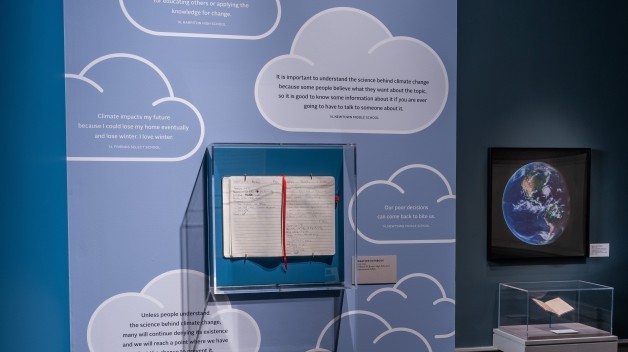Climate Education as Climate Action: A Virtual Roundtable Discussion

Photo credit: Brent Wahl, 2022
Join the American Philosophical Society and the Penn Program in Environmental Humanities for a special Virtual Discussion on the importance of climate education as a mode of climate action. This event is inspired by the PPEH’s and APS’s recent work to connect with educators and students across the Philadelphia area to consider the personal impact of global climate change through two separate projects: My Climate Story, a public research initiative supported by the PPEH, and the APS’s current museum exhibition on Becoming Weatherwise: A History of Climate Science in America.
The event will be moderated by Bethany Wiggin, Professor and Director of the Penn Program in Environmental Humanities at the University of Pennsylvania, who will be joined by a group of educators including Sarah Ray, Professor of Environmental Studies at Cal Poly Humboldt; James Damico, Professor of Literacy, Culture and Language Education at Indiana University, Bloomington; Mark Baildon, Associate Professor, Foundations of Education College at United Arab Emirates University; and Ali Rospond, Museum Education Coordinator at the American Philosophical Society’s Library & Museum, who will discuss their experiences with and approaches to teaching climate change both in and outside of the classroom.
The event will take place on Tuesday, December 13 at 1:00 p.m. ET via Zoom Webinar. The event is free to attend but registration is required. Register here to attend.
Bethany Wiggin is a Professor of German at the University of Pennsylvania where she co-founded the Penn Program in Environmental Humanities. Her scholarship explores histories of migration, language, and cultural translation since the Columbian exchange across the north Atlantic world; she is currently completing Utopia Found and Lost in Penn’s Woods. She holds research to be a human right and regularly leads public research projects designed to connect academic and community expertise for environmental action. These projects have been supported by the National Geographic, Whiting, and Andrew W. Mellon Foundations and include: Intersecting Energy Cultures, An Ecotopian Toolkit for the Anthropocene, Data Refuge, Futures Beyond Refining, and My Climate Story (selected). She has offered testimony about project findings to audiences ranging from school children, to the City Council of Philadelphia, the U.S. Congress, and UNESCO.
Sarah Jaquette Ray is chair of the Environmental Studies Department at Cal Poly Humboldt in Arcata, California, on Wiyot territory. Ray's first book, The Ecological Other: Environmental Exclusion in American Culture (Arizona, 2013) explored the phenomenon of green hate in U.S. history, and its legacy of ableism and xenophobia in mainstream ecological thought. Her current work is motivated by the despair she started observing in her students about a decade ago. Focusing on the role of emotions in climate justice advocacy, this research explores the interplay between inner resilience and collective action. Ray's book on this topic, A Field Guide to Climate Anxiety: How to Keep Your Cool on a Warming Planet (California, 2020), was written to be an existential toolkit for the climate generation. Ray's writing on emotions and climate justice activism has been published in the LA Times, Scientific American, The Cairo Review of Global Affairs, Edge Effects, KCET, and Zocalo Public Square. She consults extensively on the topic of climate anxiety, is working on an edited book, An Existential Toolkit for Climate Justice Educators, offers a professional development workshop to help center emotions in climate work, the Climate Wisdom Lab, and has begun teaching a mindfulness course on transforming climate anxiety.
James Damico is a former elementary and middle school teacher from New Jersey. He is currently a Professor of Literacy, Culture and Language Education at Indiana University, Bloomington. He is an author of many publications that emphasize critical literacies and inquiry-based teaching and learning. Since 2008 he has been teaching and researching about global climate change and exploring ways to challenge climate denial and advance ecological justice. His most recent book is titled, How to Confront Climate Denial: Literacy, Social Studies, and Climate Change published by Teachers College Press. James also writes poetry and is an avid songwriter.
Mark Baildon is an Associate Professor in Foundations of Education and Coordinator of International Collaborations and Partnerships in the College of Education, United Arab Emirates University (UAEU). Prior to joining UAEU, he served as Associate Dean of Partnerships and Analytics and the Head of Humanities and Social Studies Education at the National Institute of Education in Singapore. Mark has taught social studies in secondary schools in the U.S., Israel, Singapore, Saudi Arabia, and Taiwan. His research and teaching focus on ways to support inquiry-based learning, global education, and 21st century literacies. He has published five books, numerous refereed journal articles and book chapters, and developed a range of technology tools and curriculum materials to support teaching and learning. His latest books are How to Confront Climate: Literacy, Social Studies, and Climate Change (Teachers College Press, 2022), The Role of Language in content Pedagogy: A Framework for Teachers' Knowledge (Springer, 2022); and Research on Global Citizenship Education in Asia: Conceptions, Perceptions, and Practice (Information Age Publishing, 2021).
Ali Rospond is the Museum Education Coordinator at the American Philosophical Society’s Library & Museum (APS). Ali creates, coordinates, and implements intergenerational, school, outreach, and informal adult programming at the Society. She has also worked as an educator at the Independence Seaport Museum. Ali holds an M.A. in Museum Education from the University of the Arts and a B.A. in History/Political Science from Rutgers University.
